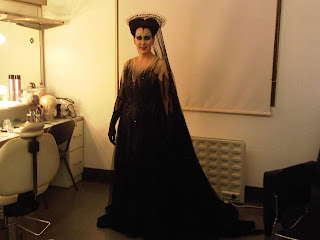Sometimes, the best stories aren’t about what happened, but what didn’t. I recently put together a CD of opera arias, and one piece in particular is prompting some comment: a little-known showpiece of wild coloratura from Salieri’s opera Europa riconosciuta, Semele’s aria ‘Quando più irato freme.’ Mainly known these days as the jealous rival of Mozart, as depicted in the stage play and film ‘Amadeus,’ in his lifetime Antonio Salieri was a highly respected opera composer. So much so that he was commissioned to write Europa riconosciuta for the inaugural production of the new La Scala opera house in Milan
In 2004 I was working at Welsh National Opera. This was the year the renovated La Scala opera house was celebrating its re-opening, and the very first opera performed in the house was being revived for the occasion. A staff member of La Scala was involved in the same production at WNO, and after returning to Italy Milan
Now, auditions vary greatly in style and substance: everything from ‘cattle-calls’ in rented, drafty rehearsal spaces on the wrong side of town, to glam on-the-main-stage affairs with my own dressing room and a rehearsal with a top-notch accompanist beforehand. Singers have to be ready for anything. Similarly, audition feedback can vary greatly: never hearing anything, getting a rejection letter eventually, being hired a few days, weeks, or months later…being offered the job on the spot is almost unheard of. Almost. In Milan
Several sopranos auditioned for the role of Semele in Europa Riconosciuta. A couple of hours later, four of us were asked to sing again, this time on the stage of the theatre. After singing that round, we waited in the foyer, and were called in one at a time. When it was my turn, they offered me the engagement. They informed me I would need to start rehearsals the following day. Considering I was booked on a flight home that afternoon, and was at the time a widowed mother of a 5-year-old, I said that really wasn’t possible, and could we see about giving me a little time to arrange accommodation, childcare, ummm, pack a suitcase with a few more clothes, etc.
It was agreed that I had until the end of the week to sort myself out, and I phoned my agent in a daze to tell her what had happened. She immediately set about helping me sort out the two problems facing me: 1) finding some local childcare during the rehearsal period, and 2) clearing things with Welsh National Opera, where I was still under contract. Several days and several frantic phone calls later, it became clear that finding childcare was going to be the easier of the two tasks. While WNO bent over backwards to make it possible for me to go to Milan while still fulfilling my obligations to them, La Scala could not release me to WNO on a crucial date clash. So….rather than break a promise, and ruin my reputation as a reliable, ethical, and honest soprano (oh yes, we do exist), I said ‘no.’ To La Scala. To the oldest, most historically saturated, famous opera house in the world. But, hey, what makes better dinner-party conversation: ‘I once sang at La Scala,’ or ‘I once turned down La Scala’? And I’ve got a unique audition piece up my sleeve.
p.s. If anyone from Milan
‘Quando piu irate freme’ from Europa Riconosciuta by Antoio Salieri is included on the recently released CD, ‘Virgins & Queens ’ available for purchase at www.lauremeloy.co.uk




